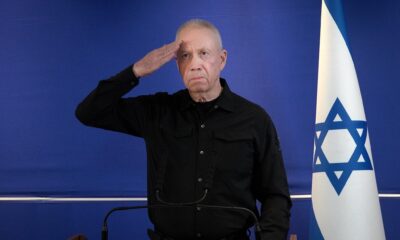
Israel News

Israel used as ‘political football’ in local elections
Local elections are about the nitty-gritty of daily life: fixing potholes, water, and electricity, maintaining infrastructure, and service delivery. But a number of political parties, individuals, and media outlets thought that bringing a faraway conflict into the picture would sway people’s votes.
“A vote for the DA [Democratic Alliance] is a vote for Israel!” screamed the headlines of the October 2021 edition of local community newspaper Muslim Matters.
“Al Jama-Ah or DA. Shame on you. It’s your choice. Vote Al Jama-Ah, end occupation and Zionist prayers in Al-Aqsa mosque,” read a pamphlet from political party Al Jama-Ah.
Paul Jacobson, who stood for the Freedom Front Plus in Ward 54 in Cape Town, shared the opposite viewpoint in a Facebook post on 28 October: “Whilst the DA have turned their backs on our Jewish population and community, showing partiality towards Palestine rather than Israel, myself and FF Plus remain loyal and dedicated to the legitimacy and protection of Israel,” he wrote. “The DA could have remained silent and impartial, but rather they chose to favour Palestine. This was reaffirmed to me by Alderman JP Smith, in a private conversation, where he believes that he has studied both the Israeli and Palestinian arguments, and again finds favour with the Palestinian cause.”
Responding to the Al Jama-Ah pamphlet in particular, the Institute of Race Relations’ Sara Gon says, “It’s intriguing that Al Jama-Ah should use the Israel/Palestinian conflict to promote its candidates in a local election which is a bread-and-butter election about issues that affect people’s daily lives and the environment that they live in.
“The antisemitism and falsehoods [Zionist prayers in the Al-Aqsa mosque] says a lot about Al Jama-Ah,” she says. “The fact that it should even choose a topic that has nothing to with South Africa locally or nationally means that the party’s obsession with the conflict is disturbing. It shouldn’t matter in this election whatsoever, except in the potential renaming of streets.
“Whether it plays into the constituencies it’s aiming at one doesn’t know,” she says. “If it does, it’s saying that there are Muslim voters who will place emotions above needs in a local election. Those voters who do want to see change in their immediate lives are none the wiser about what Al Jama-Ah’s candidates can do for them. I would hope that at best for them these pamphlets could be ignored, and at worst, they may turn voters against them for raising a frankly irrelevant issue. It’s in bad taste, but to each political party its own.”
Local political analyst Ralph Mathekga told the SA Jewish Report that bringing Israel into local elections showed just how dysfunctional politics had become in South Africa. “The problem [in these cases] is that local government elections become less about local issues and service delivery. They become highly politicised, to the point where the issues that are supposed to be the most prominent aren’t actually being attended to.”
He says this isn’t a new dynamic in South African politics, even at local level. “Remember one of the MECs in Tshwane had to apologise for her position regarding Israel at local government level. And the EFF [Economic Freedom Fighters] at some point threatened to walk out of the coalition with the DA because of its position in relation to Israel – and all of these have been in the local government theatre.”
However, just because it’s been done before doesn’t mean it’s healthy for anyone – especially in South Africa’s current political climate. “It shows you how highly politicised our politicians are – at times to the point of dysfunction, because this just brings unnecessary tension to an area that is already stressed,” says Mathekga. “The issue belongs nowhere near local government, but it’s being brought to bear.”
Meanwhile, DA MP and shadow minister of international relations and cooperation, Darren Bergman, didn’t mince his words in response to the references to Israel. “This is disgusting and once again, another prime example of how voters in South Africa have their emotions abused for the convenience of politicians. It’s exploitative and seems to be targeted at the DA – a peace-loving and secular party that’s a warm house to all faiths and religions. The DA has been calling for a two state-solution consistently, not just during elections or intifadas.”
South African Jewish Board of Deputies National Director Wendy Kahn notes that in past elections, “We have frequently seen the Israeli-Palestinian conflict being brought into political fray as a way to appeal to voters. This is particularly prevalent during national elections. We don’t see this as much during local government elections where the focus is on aspects closer to home such as water, electricity, service delivery, and potholes. And this is how it should be. A conflict on a different continent should have no bearing on the election of councillors in a ward in Johannesburg or Bloemfontein.
“Fortunately, in this election, there have been few attempts to harness voters using anti-Israel campaigns,” she says. “One instance has been the African National Congress [ANC] and Africa4Palestine Boycott Divestment Sanctions-branded billboards. It’s reprehensible to exploit a conflict that elicits strong emotions as a way to manipulate votes. These campaigns bring unnecessary divisive and polarising dynamics into an already fraught political landscape.”
Says South African Zionist Federation National Chairperson Rowan Polovin, “It has become common practice in South African political discourse for political parties to use Israel as a ‘wedge issue’ in a cheap and dirty attempt to drive away or gain votes. In the current election cycle, we have seen the ANC, EFF, and other smaller parties use this pitiful tactic to claim other parties are ‘Zionist’ or to make for-show solidarity speeches about the Palestinians.
“Invariably, this technique fails because voters aren’t so easily duped and are more interested in local service delivery issues such as water, sanitation, and electricity than foreign affairs. Of course, the irony isn’t lost that Israeli technology could solve many of our country’s service delivery problems and that political parties should focus on partnering with Israel to deliver on the needs of South African citizens instead of engaging in petty anti-Israel electioneering games.”










